| Border Lord | ||||
|---|---|---|---|---|
 | ||||
| Studio album by | ||||
| Released | February 1972 | |||
| Genre | Country | |||
| Length | 33:27 | |||
| Label | Monument | |||
| Producer | Fred Foster | |||
| Kris Kristofferson chronology | ||||
| ||||
Border Lord is the third album by Kris Kristofferson, released in 1972 on Monument Records.
| Border Lord | ||||
|---|---|---|---|---|
 | ||||
| Studio album by | ||||
| Released | February 1972 | |||
| Genre | Country | |||
| Length | 33:27 | |||
| Label | Monument | |||
| Producer | Fred Foster | |||
| Kris Kristofferson chronology | ||||
| ||||
Border Lord is the third album by Kris Kristofferson, released in 1972 on Monument Records.
After enjoying enormous success as a songwriter in 1970 and 1971, including Song of the Year awards from both the Country Music Association and Academy of Country Music, Kristofferson’s second album, The Silver Tongued Devil and I, established him as a recording artist in his own right. However, after having the luxury of honing his compositions over a period of years, he had just a matter of months to write songs for Border Lord. As noted by AllMusic's William Ruhlmann:
…he was afforded precious little time to craft his next work. Border Lord, which, like its predecessors, was an album of all-original compositions, was in record stores only seven months after The Silver Tongued Devil and I, and it was his third such collection in 20 months. He continued to draw upon the dwindling store of songs in his trunk, using the 1967 copyright "Burden of Freedom," as well as "Somebody Nobody Knows," published in 1968, while two others, "Smokey Put the Sweat on Me" and "When She's Wrong," were published by his first publisher, Buckhorn Music, suggesting that they may have been written well before their 1972 copyright dates.
A dominant theme in the songs on Border Lord is the ill treatment of women, with six tunes, including “Josie” and “Little Girl Lost,” concerning females who had become debased in some way, for which the narrator seems to feel some vicarious or personal guilt. [1] The image of the Devil, already prominent in previous compositions like “The Silver Tongued Devil and I” and “To Beat the Devil,” reappears in five of the songs, giving the collection a desperate, despairing mood overall. Now in demand as a touring performer, two songs, “Getting’ By, High and Strange” and the title track reflected his current circumstances on the road.
Two songs, “Josie,” and “Burden of Freedom,” mined similar territory thematically as “Me and Bobby McGee,” but when "Josie" was released as the album’s lone single it only struggled into the lower reaches of the pop charts. Record World said of "Josie" that it's "a typical 'Kristoffersong — well-written, well-put country-pop." [2]
In 2019, Sheryl Crow released her own version of the title track featuring Kristofferson on her album Threads .
| Review scores | |
|---|---|
| Source | Rating |
| AllMusic | |
Border Lord was released in February 1972 but failed to achieve the success its predecessors had. At the time of its release, Ben Gerson of Rolling Stone was unkind, charging that Kristofferson was “a fast-livin’, hard lovin’ dude who has just enough time between ballin’ and brawlin’ to jot down a tune or two. He’s a cracker-barrel philosopher…Kris’ celebrations of machismo are his most patently stupid observations.” [4] Biographer Stephen Miller opines “While Kris produced some of his affecting poetry with characteristic cleverness, the melodies were unremarkable and with his limited vocal range, a number of the songs suffered from a dirgeful quality.” [1] AllMusic lamented the rushed gestation of the songs, remarking “No doubt Kristofferson and Monument would have been better advised to have waited until he had a collection of songs to match his early hits; instead, he quickly began work on yet another album, Jesus Was a Capricorn, which was out before the end of the year.” Writer Michael Streissguth praises the album, maintaining it offered lyrical themes that remained “strongly individualistic and never failed to challenge Nashville’s sensibilities.” [5] In a 2016 Rolling Stone interview with Neil Strauss, Kristofferson said he was pleasantly surprised with the box set of his work The Complete Monument & Columbia Album Collection, particularly Border Lord, admitting, "I can remember at the time being so disappointed at the reception it got."
All songs by Kris Kristofferson except as noted
We put a lot of road between this album and the last one, back and forth across the U.S. of A. and Canada, hitting most of the high spots and all of the lows. Cruising pretty close to crazy, but somehow keeping it together enough to keep from crossing that border. We made some friends and left some enemies along the way, and I guess we'll continue to. It all adds up to miles and memories, and, like Satchel Paige said, "Don't look back; something might be gaining on you."
—Kris Kristofferson
| Chart (1972) | Peak position |
|---|---|
| US Billboard 200 [6] | 41 |
| US Top Country Albums (Billboard) [7] | 6 |

The Silver Tongued Devil and I is the second studio album recorded by singer-songwriter Kris Kristofferson. It was produced by Fred Foster, released in July 1971 on Monument Records and followed his critically acclaimed debut Kristofferson.
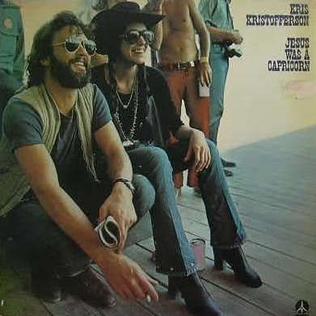
Jesus Was a Capricorn is the fourth album by Kris Kristofferson, released in 1972 on Monument Records. The album cover pictures Kristofferson and his soon-to-be wife Rita Coolidge. "Why Me" reached #1 on the Country singles charts.
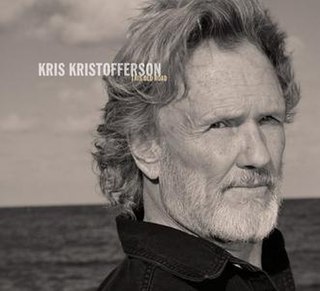
This Old Road is an album by Kris Kristofferson, released in 2006 on New West Records. The underlying theme of the record is a retrospective and reflective look at what Kristofferson deems to have been important elements of his life.
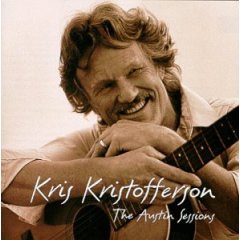
The Austin Sessions is a studio album by Kris Kristofferson, released on Atlantic Records in 1999. It features stripped-down versions of Kristofferson's most famous material, including "Me and Bobby McGee", "Sunday Mornin' Comin' Down" and "Help Me Make It Through the Night". Several well-known artists contributed vocals to the album, including Steve Earle, Jackson Browne, Matraca Berg, Vince Gill, Marc Cohn, Alison Krauss, Catie Curtis and Mark Knopfler.

A Moment of Forever is an album by Kris Kristofferson, released on Justice Records, an independent record label, in 1995. His first studio album of original material since the relatively unsuccessful political record Third World Warrior (1990), it features several well-known studio musicians, including Jim Keltner and Benmont Tench. The album retained the recurring theme of freedom from oppression, but to a lesser extent than his previous two politically charged records - the aforementioned Third World Warrior and Repossessed (1986). The song "Johnny Lobo" is about the Indian activist John Trudell.

Live at the Philharmonic is a live album by Kris Kristofferson, released on Monument Records in 1992. Performed at Philharmonic Hall in New York City on December 2, 1972, the concert followed the release of Kristofferson's successful Jesus Was a Capricorn. Aside from several songs from the latter, the singer performed a number of new pieces, as well as a few of his well-known hits such as "Sunday Mornin' Comin' Down" and "Me and Bobby McGee". Guest artists included Willie Nelson, who was a little-known personality in country music at the time, Rita Coolidge, Kristofferson's future wife, and Larry Gatlin, whose career was in its starting phases.
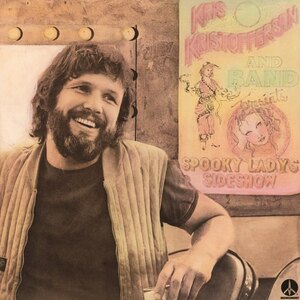
Spooky Lady's Sideshow is the fifth solo album by Kris Kristofferson, released in 1974 on Monument Records. It was preceded and followed by duet albums with his wife, Rita Coolidge. It was recorded shortly after Kristofferson's appearance in the movie Pat Garrett and Billy the Kid. The album mostly consists of songs about decline due to alcohol and drug abuse. That theme of decline proved to be (unintentionally) prophetic as this was Kristofferson's first album that failed to see commercial success on a large scale.

Who's to Bless and Who's to Blame is the sixth solo album by Kris Kristofferson, released in 1975 on Monument Records. Its title track is quoted in the Johnny Cash song "The Man Comes Around" from the 2002 album of the same name. The song "Stranger" was covered as a duet by Johnny Duncan and Janie Fricke, and their version reached #4 on the U.S. country chart in 1976.
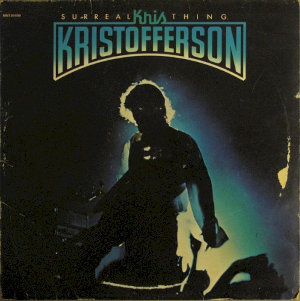
Surreal Thing is the seventh solo album by Kris Kristofferson, released in 1976 on Monument Records. "Killing Time" and "The Golden Idol" are re-recordings of songs that were originally released as a single in 1967.

Easter Island is the eighth solo album by Kris Kristofferson, released in 1978 on Monument.

Repossessed is an album by Kris Kristofferson, released on Mercury Records in 1986. It was Kristofferson's first full-length solo album since 1981's To the Bone, although the singer did collaborate with other artists in the meantime, most notably on Highwayman with Johnny Cash, Waylon Jennings and Willie Nelson.
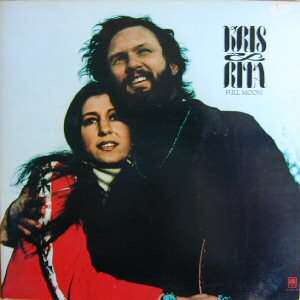
Full Moon is a duet album by Kris Kristofferson and Rita Coolidge, released in September 1973 on A&M Records. It is the first of three duet albums by the couple, who married weeks before the album's release, and arguably the best. Unlike Kristofferson solo albums, it features several covers.
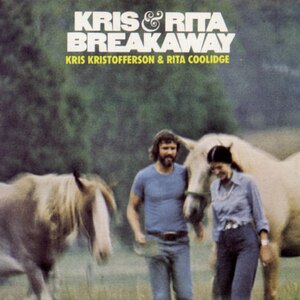
Breakaway is the second duet album by Kris Kristofferson and Rita Coolidge, released in 1974 on Monument Records. It is one of three duet albums by the couple. Unlike Kristofferson solo albums, it features several covers. "I've Got to Have You" and "I'd Rather Be Sorry" had both previously been hits for other artists; they appear here by Kristofferson for the first time.
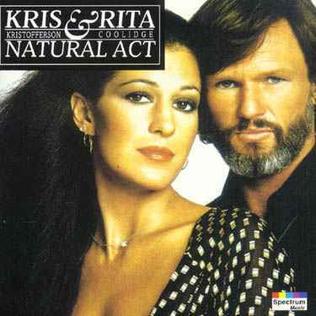
Natural Act is the third and final duet album by Kris Kristofferson and Rita Coolidge, released in 1978 on A&M Records. The couple would divorce the following year. The album was released while Coolidge's career was at a peak; her recent albums Anytime...Anywhere and Love Me Again had seen much commercial success. Natural Act is Kristofferson's only album to chart in the United Kingdom.

Shake Hands with the Devil is the ninth solo album by Kris Kristofferson, released in 1979 on Monument Records. Several of the songs on the album were written by Kristofferson years before its release.

To the Bone is an album by Kris Kristofferson, released in 1981, his last for Monument Records. It is his first album after his divorce from Rita Coolidge, and many of its songs deal with relationship decline. "Nobody Loves Anybody Anymore" became a minor hit.

Music from Songwriter is a soundtrack album by Kris Kristofferson and Willie Nelson, released on Columbia Records in 1984. It is the soundtrack to Songwriter, a film starring the two performers. Two of the songs on the record are duets, five are sung by Nelson and four by Kristofferson. "How Do You Feel About Foolin' Around" was released as a single and reached the country charts, and the album itself was nominated for an Academy Award, losing to Purple Rain. The album has been released by Wounded Bird Records.

Fall into Spring is a 1974 album by Rita Coolidge and was released on the A&M Records label.

Please Don't Tell Me How The Story Ends: The Publishing Demos is the first release of the demos recorded by Kris Kristofferson between 1968 and 1972 while working as a janitor at Columbia Records. Many of the songs would be rerecorded on later Kristofferson albums or by other artists including Janis Joplin, Al Green, and Johnny Cash.

Steve Goodman is the debut album of singer/songwriter Steve Goodman, released in 1971. It included both of his most well-known compositions: "City of New Orleans", first covered by Arlo Guthrie, and an early version of "You Never Even Call Me by My Name," which, with some modifications, was covered by David Allan Coe. In 1990 Sequel Records issue the album on CD.